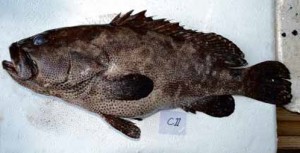In the Know: Lapu-lapu (grouper) species in PH
EPINEPHELUS

LAPU-LAPU COUNTRY There are at least 27 lapu-lapu(grouper) species in the Philippines, of which six are “vulnerable” or “near-threatened.” CONTRIBUTED PHOTO
Epinephelus is one of the widely distributed genera of groupers, characterized as having yellowish white or brown color with dark spots and rounded tail.
Groupers belonging to this genus, which has an average length of 24 centimeters to 100 cm, can be found in the provinces of Palawan, Sorsogon, Romblon and Cebu.
CEPHALOPHOLIS
The genus Cephalopholis has colors ranging from yellowish, reddish and dark brown with stripes or spots on the head and body.
With length ranging from 23 cm to 50 cm, this type of grouper thrives in shallow waters with silty reefs in the provinces of Palawan, Marinduque and Surigao.
PLECTROPOMUS
Plectropomus is a genus of tropical Indo-Pacific fishes that includes food fishes and other fishes that can be dangerously poisonous when eaten.
Belonging to this genus are:
o Leopard coral groupers or the common coral trout (Plectropomus leopardus), which are usually red to greenish brown in color and whose fins, head and body have numerous small, dark-edged, blue dots;
o Spotted coral groupers or the square-tail coral groupers (Plectropomus areolatus), which are reddish brown with many light blue, dark-edged spots on the head and body, and which inhabit coral reefs; and
o Black saddled coral groupers (Plectropomus laevis), which are listed as “vulnerable” because of their natural rarity and are among the most valuable fish in the live reef-fish export trade.
SLENDER GROUPER (Anyperodon leucogrammicus)
Also known as “white-lined cod,” “white-lined grouper” and “white-lined rockcod,” slender groupers have elongated bodies and rounded tails. They are grayish brown with four horizontal whitish streaks on the head and body with many small, orange spots on the body, head and fin.
They live in coral-rich areas and clear waters on lagoon and seaward reefs, and feed mainly on fishes and crustaceans.
In some areas, slender groupers are threatened with overfishing, according to the International Union for the Conservation of Nature (IUCN). Though they are not specifically targeted for commercial fishing, they occasionally appear in Hong Kong live fish markets. Juveniles, on the other hand, are targeted for aquarium trade.
Slender groupers occur in marine protected areas in the Philippines and other countries, such as Palau, Malaysia and Australia.
HUMPBACK GROUPER (Cromileptes altivelis)
Also known as “barramundi cod,” “flatfish grouper” and “humpback rockcod,” humpback groupers have very small, pointed heads and are light-colored with scattered, large, black spots. They can be found in silty coral reef areas, often in very shallow water.
The IUCN lists humpback groupers as “vulnerable,” as they are usually targeted for live reef-fish trade, especially in Southeast Asia, where they are “heavily exploited” due to their high market value.
According to the IUCN, many tons of this fish enter the center of trade in Hong Kong, mainly from the Philippines, Indonesia and Malaysia.–Compiled by Inquirer Research
Sources: Fishes of the Philippines, iucnredlist.org, Merriam-Webster, australianmuseum.net.au